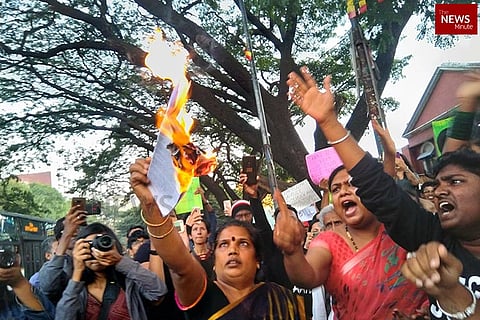

When Rajya Sabha passed the contentious Transgender Persons (Protection of Rights) Bill on Tuesday, many called it “Gender Justice Murder Day.” Transgender communities in India have consistently been protesting against the Bill, which, some say, is a law that is “equal to killing trans people.” And now, as the Bill awaits Presidential assent to become a law, transgender persons and allies are continuing with another round of protests opposing it in different parts of the country.
On Wednesday evening around 5 pm, there were three people at Mysore Bank Circle, the protest venue in Bengaluru. They said they expected less than 50 people. But the show of strength was hard to miss as hundreds showed up. The protest kept expanding sideways, and grew to take over the pavement, but keeping away from the road to ensure a smooth flow of traffic.
The air was rent with calls of “Kick out trans Bill!” “We want justice!” and “Down down trans Bill!”
One of the protesters, Mallappa, told TNM that the Bill is unconstitutional and does not guarantee their rights. “The President must not sign the Bill, and must send it back to Rajya Sabha. A select committee must discuss it with the trans community and re-draft the Bill.”
If this doesn’t happen, trans communities are determined to leave no stone unturned to ensure that it does not become a law in its present form. At a press conference held by transgender persons and some allies on Wednesday afternoon, Rumi Harish, a Hindustani classical vocalist who is a trans man, said that they would knock on the Supreme Court’s doors to challenge the law if it receives the President’s assent in its current form.
Bill deems trans persons as ‘less than’
Registering their protests against the Bill, those at the press conference also pointed out that it not only violates transgender persons’ rights to self-determination, but also establishes a hierarchy where trans persons are ‘less than’ cis persons – that is, those who identify with the gender they were assigned at birth.
Madhu Bhushan, a writer and activist, pointed out for instance that the maximum penalty for sexually abusing a transgender person is two years imprisonment and a fine, under section 18. In comparison, the Criminal Law (Amendment) Bill, 2018, which came after the 2012 Delhi Nirbhaya gangrape and murder, deemed the minimum punishment for raping a woman over 16 years as 10 years, which can go up to life imprisonment.
“All the progress made with the protests following the Nirbhaya case is not seen in this Bill. Is there a hierarchy in considering genders affected by rape, such that the first gender is male, the second gender is female and the third gender is the transgender community?” Madhu asked.
Violation of human rights
One of the most contentious issues with the Transgender Persons Bill has been the requirement for a certificate from the District Magistrate and district screening committee to be certified as a trans person. A revised certificate can only be gotten if the person has undergone a gender affirmation surgery. There is no provision for an appeal or review of the DM’s decision.
This, protesters say, is completely against the right to self-determination granted by the Supreme Court’s 2014 NALSA judgment, which deemed medical intervention unnecessary to self-identify one’s gender.
Sai, a trans man, speaking at the press conference on Wednesday argued, “Without that certificate, you won't have the right to live with dignity, and no access to any other rights. Then where should we go? There are no reservations for us in education or jobs unless we have surgery.”
“Forget for a minute if the person is gay, lesbian or transgender – where is the basic right of an individual to privacy?” Sai added.
The Bill also does not take into account the rights of transgender communities to things like inheritance, family, marriage, and so on, Madhu Bhushan pointed out.
Arvind Narrain, a member of Alternative Law Forum, added, “This is a Bill for the protection of the community, but it doesn’t even recognise our rights.”
‘Our gender identity is not your charity’
Rohan Mathew, an activist and writer, stated that the major problem with the Bill came from lack of research, and the fact that the lawmakers did not involve the communities in drafting it.
“They (the government) are unwilling to hear anything we have to say because we have been protesting for a while now. You have left the entire community in a position where we have no agency,” Rohan said.
“How can you occupy our bodies?” he questioned. “You cannot talk to us as though our human rights and our gender identities are your charity.”
Agitators say they will continue to protest regularly until their voices are heard, and the Bill is amended to reflect their concerns.